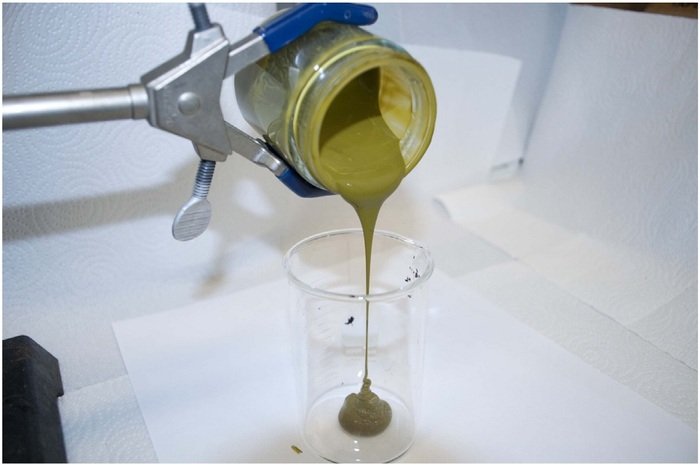A slurry of algae, the starting point of crude oil production in a laboratory. Credit: DOE/PNNL
RICHLAND, Wash., Dec. 18 (UPI) -- U.S. researchers say they've created oil from algae in just hours in a laboratory, a process that in nature requires millions of years.
Engineers at the U.S. Department of Energy's Pacific Northwest National Laboratory report they've developed a chemical process that produces useful crude oil minutes after a soupy paste of harvested algae is poured in.
In the process, a slurry of wet algae is pumped into the front end of a chemical reactor, and in less than an hour it yields crude oil, along with water and a byproduct stream of material containing phosphorus that can be recycled to grow more algae.
The crude algae oil can be converted into aviation fuel, gasoline or diesel fuel, the researchers said, and the waste water can be processed further to yielding burnable gas and substances like potassium and nitrogen.
While a number of companies have produced algae-based fuels on a research scale, the fuel is projected to be expensive, so the engineers worked to harnesses algae's energy potential efficiently and incorporate a number of methods to reduce the cost of producing algae fuel.
"Cost is the big roadblock for algae-based fuel," Douglas Elliott, the leader of the PNNL research, said. "We believe that the process we've created will help make algae biofuels much more economical."
The most important cost-saving step is that the process works with wet algae, whereas most current processes require the algae to be dried, which takes a lot of energy and is expensive.
The new process works with an algae slurry that contains as much as 80 percent to 90 percent water.
"Not having to dry the algae is a big win in this process; that cuts the cost a great deal," Elliott said. "Then there are bonuses, like being able to extract usable gas from the water and then recycle the remaining water and nutrients to help grow more algae, which further reduces costs."
The process runs at around 662 degrees Fahrenheit at a pressure of around 3,000 PSI, the researchers said.
"It's a bit like using a pressure cooker, only the pressures and temperatures we use are much higher," Elliott said. "In a sense, we are duplicating the process in the Earth that converted algae into oil over the course of millions of years. We're just doing it much, much faster."















